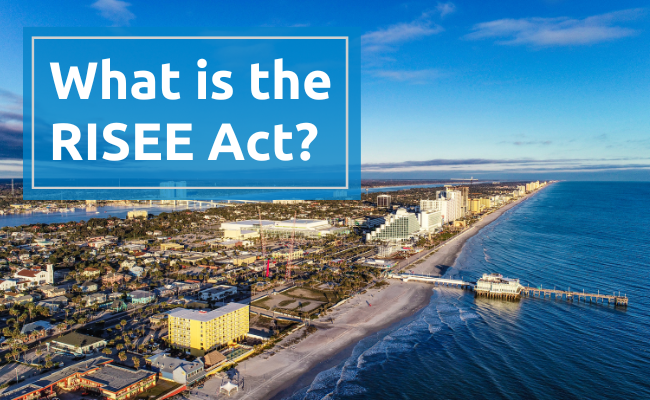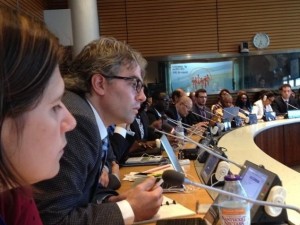By Katie Zakrzewski
The RISEE Act, or the Reinvesting in Shoreline Economies and Ecosystems Act, was first introduced in the Senate with the bipartisan support of Sen. Sheldon Whitehouse (D-RI) and Sen. Bill Cassidy (R-LA) as S. 2130 in 2021.
Offshore wind energy is unique in terms of clean energy. Other forms of energy are subject to royalties or revenue that is shared with adjacent states and conservation programs. Revenue from offshore wind, however, is returned to the United States Treasury. The RISEE Act would create a revenue-sharing model for offshore wind energy. The bill also dedicates funding to the National Oceans and Coastal Security Fund (NOCSF), and reforms the Gulf of Mexico Energy Security Act (GOMESA)
CCL’s support of the RISEE Act last Congress, as well as the reintroduction of the RISEE Act into the 118th Congress, may have you wondering about the ins and outs of the bill.
Why do we need the RISEE Act?
Due to climate change, 25 million people live in areas that are considered vulnerable to coastal flooding, not to mention that coastal and ocean activities account for 58% of U.S. GDP. Climate change has caused rising sea levels, storm surges, increases in ocean temperature, and acidification, all of which are harmful to coastal communities. The RISEE would develop dedicated funding streams for coastal infrastructure and resilience efforts to safeguard vulnerable communities and businesses most threatened by sea level rise and coastal erosion.
“CCL appreciates the leadership of Senators Whitehouse and Cassidy in reintroducing the RISEE Act. Each year, climate change brings greater harms to our coastal communities and habitats,” said CCL’s Vice President of Government Affairs, Ben Pendergrass. “The RISEE Act would establish a much-needed source of funding from offshore wind development to protect our shorelines. We urge Congress to take action on this important bill.”
“The RISEE Act moved through the Senate Energy Committee with strong bipartisan support last Congress, and we look forward to seeing the same momentum this time around,” said Sen. Cassidy in a press release issued by his office. “This bill takes the lessons that Louisiana has learned to strengthen our coasts, adds more funding, and serves as a model for other coastal states.”
Sen. Whitehouse, who has worked alongside CCL to champion climate issues and who reintroduced the bill alongside Sen. Cassidy, also spoke about the RISEE Act.
“Coastal states like Rhode Island need far more resources to protect homes and businesses from rising seas and other increasingly severe climate threats,” said Sen. Whitehouse. “Our bipartisan bill will allow states to get a share of federal revenues from the growing offshore wind industry to make needed investments in resiliency.”
Rep. Lizzie Fletcher (D-TX-07), who co-sponsored the bill, spoke about the impact of coastal flooding in Texas.
“Along the Texas Gulf Coast, we know all too well the devastating impacts of flooding and disasters as well as the way that visionary projects can help protect our communities,” said Rep. Fletcher. “The RISEE Act will help make it possible for us to invest in these vital coastal protection projects by giving states a portion of the revenue generated from offshore wind and energy projects, providing incentive for future projects. I am glad to partner with Representatives Davis, Weber, Eshoo, Mace, and Spanberger to reintroduce this legislation in the House and with Senators Whitehouse and Cassidy in the Senate to protect our communities, our ecosystems, and our economy.”
Rep. Randy Weber (R-TX-14) emphasized the sentiments made by Rep. Fletcher.
“The Texas Gulf Coast is home to millions of people, countless homes and jobs, and numerous refineries. The RISEE Act would advance critical restoration and resilience projects to ensure our coastline has the necessary investments to help protect against future storms,” said Rep. Weber. “This is vital for the Gulf Coast region and our nation.”
Expansion of wind energy
From 2020 through early 2021, offshore wind energy grew 24%. This falls in line with the Biden Administration’s goal of deploying 30 gigawatts of offshore wind energy by 2030.
Under the RISEE Act, revenue from offshore wind energy would be allocated with regard to adjacent states, the National Oceans and Coastal Security Fund, and the United States Treasury. State revenues would be protected from automatic spending cuts that occur through the withdrawal of funding for certain government programs, also known as sequestration.
The role of states and the nitty gritty of the RISEE Act
States can use funds in several ways:
- To focus on coastal restoration, hurricane protection, and infrastructure improvements
- To mitigate damage to fish, wildlife, and other natural resources, including fisheries
- For the implementation of federally approved marine, coastal, or comprehensive management plants
The bill will also make some valuable changes to how funding is allocated and where funding goes. The RISEE Act would provide the National Oceans and Coastal Security Fund (NOCSF) with additional revenue to help them respond to coastal erosion sea level rise, as the NOCSF doesn’t currently have a dedicated source of funding. The RISEE Act would also ban oil and gas leasing off of the Florida coastline, and protect GOMESA from sequestration. The RISEE Act would also provide the Land & Water Conservation Fund with funding that doesn’t come from offshore oil and gas leases, as well as eliminating their funding cap.
If you want to dive deeper into what the RISEE Act does, you can read our one-pager, or watch the training below.
How can you help?
Now that the RISEE Act has been reintroduced in the 118th Congress, the time is now to tell your Senators and House Representatives to support the bill. We have an easy-to-use online tool for you to send an email to your representatives, asking them to cosponsor the RISEE Act.
Ask your member of Congress to support the RISEE Act here




